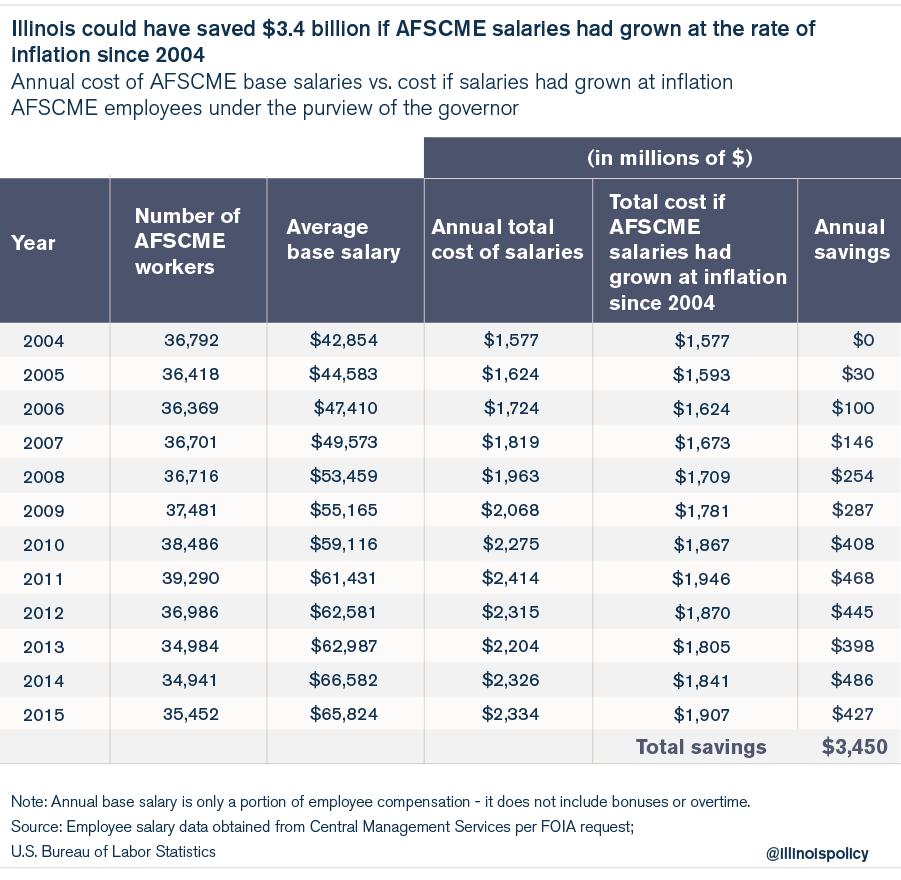Rauner moves to declare impasse in negotiations with AFSCME
Lacking signs of progress after 24 bargaining sessions with Illinois’ largest government-employee union, Gov. Bruce Rauner says that “further negotiation is no longer worthwhile.” AFSCME continues to ignore the fact that the people who pay its members’ salaries and benefits, Illinois taxpayers, continue to struggle in a difficult Illinois economy. Illinois workers, faced with stagnant earnings, are now paying for AFSCME salaries that are double their own.
After a year of negotiations with the American Federation of State, County and Municipal Employees over a new labor contract that expired in June 2015, Gov. Bruce Rauner has asked the Illinois Labor Relations Board to determine whether AFSCME and the state have reached an impasse in their negotiations.
In a letter to all state employees, the governor said that a review by the board has become the only option since AFSCME has failed to negotiate in good faith, rejecting the many concessions offered by the state. According to the governor:
Instead of acting reasonable like the state’s other union leaders, AFSCME bosses have said no to merit bonuses, they’ve said no to programs to help minority employees, and they’ve said a 40-hour work week is too long. At a time of unprecedented fiscal crisis, AFSCME is pushing insurance and wage demands that would cost taxpayers more than $3 billion. As a result, we are asking the Labor Board to determine the next steps in the negotiating process.
If the board determines the two sides have reached an impasse, that both parties have negotiated in good faith and that the governor has presented his last, best and final offer, then the governor will have the authority to implement that offer.
If the board determines that an impasse has not yet been reached, the two parties will continue to negotiate until an agreement is reached or an impasse finally occurs, as determined by the board.
Rauner is seeking to reach an agreement similar to what the state has already negotiated with 17 other unions, including the Teamsters. The governor arrived at agreements with the other unions with an understanding that the state has the “nation’s worst credit rating, a multi-billion dollar unpaid bill backlog, record unfunded liabilities and an eroding tax base.”
AFSCME continues to ignore the fact that the people who pay its members’ salaries and benefits, Illinois taxpayers, continue to struggle in a difficult Illinois economy.
Not only that, but since 2005, AFSCME worker salaries have grown five times faster than Illinois workers’ median earnings. AFSCME base salaries have grown at a pace of 4.6 percent yearly, while Illinois workers’ median earnings have grown by just 0.9 percent annually during that same time.
That growth rate has put pressure on Illinois’ budget year after year. The state could have saved a cumulative $3.5 billion had AFSCME salaries simply grown at the rate of inflation since 2004. The budget impact in 2015 alone would have been more than $425 million.
Rauner is also right to focus on reforming health care costs. State-government employees are provided generous health insurance plans – often with no deductibles – and contribute only a small share toward that coverage.
Any health care reforms the governor accomplishes with AFSCME will have far-reaching effects because the agreement is usually used as a model for the state’s other labor agreements. More than 230,000 active state workers and their dependents get their health insurance through the State Employees Group Insurance Plan.
With the state in such a financial crisis and AFSCME benefits far more lavish than those in the private sector, Rauner has an obligation to align the cost of government with what taxpayers can afford.

